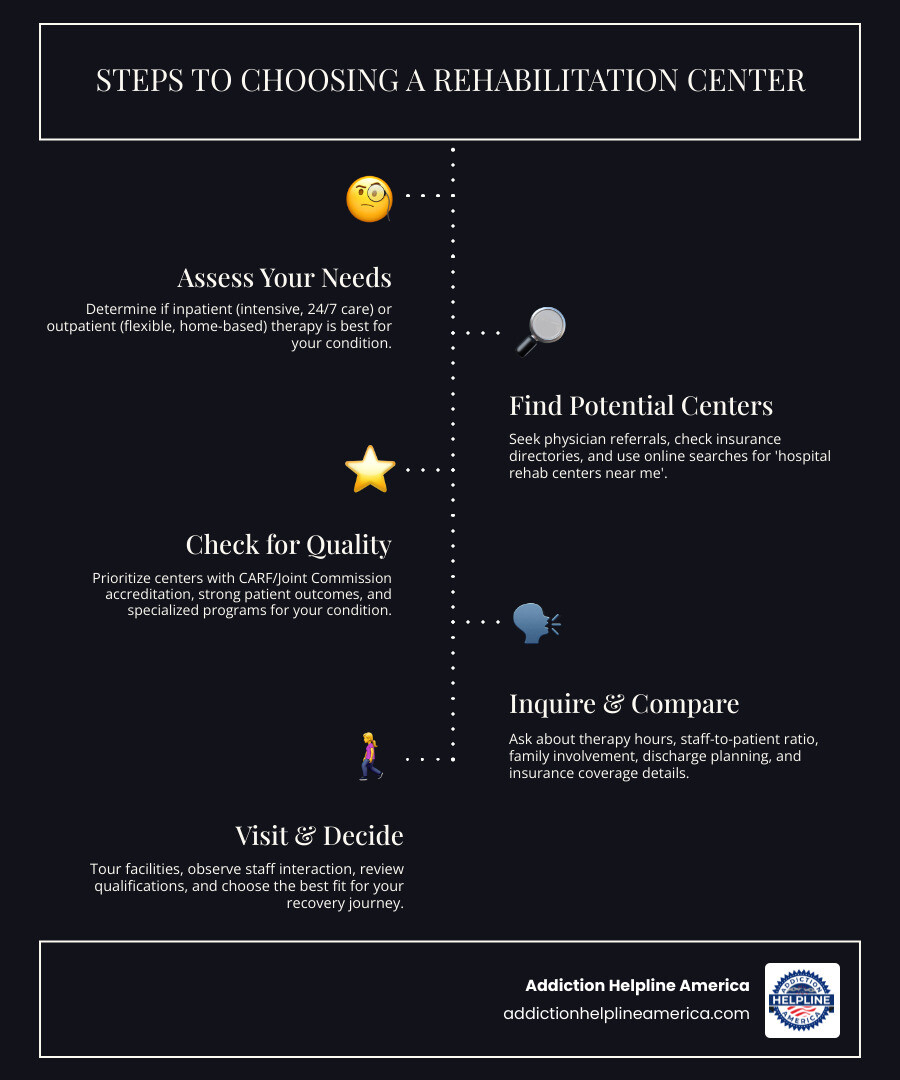
Why Finding the Right Hospital Rehab Center Matters for Your Recovery
Hospital rehab centers near me offer specialized services to help patients regain independence after a serious illness, injury, or surgery. The center you choose can profoundly impact your recovery outcome.
Quick Guide to Hospital Rehab Centers:
- Inpatient Programs: Offer 24/7 nursing care with at least 3 hours of therapy daily, 5 days a week.
- Outpatient Programs: Provide flexible therapy schedules while you live at home.
- Top-Rated Indicators: CARF or Joint Commission accreditation, and outcomes exceeding national averages.
- Core Services: Physical, occupational, and speech therapy under medical supervision.
- Specialized Programs: Stroke recovery, spinal cord injury, brain injury, and more.
After a major medical event, choosing a rehabilitation facility is a critical decision. Research shows that patients at leading centers regain more independence and achieve a higher quality of life. These facilities use a comprehensive team approach, with physical, occupational, and speech therapists working with specialized physicians on your personalized treatment plan.
Understanding what separates an exceptional hospital rehab center near me from an average one—from accreditation and therapy intensity to patient outcomes—empowers you to make the best choice. At Addiction Helpline America, we know that informed choices lead to better outcomes and renewed hope. We’re here to help you steer these complex healthcare decisions.

Basic hospital rehab centers near me terms:
Understanding the Types of Hospital Rehabilitation Services
When searching for hospital rehab centers near me, you’ll find different programs designed to match your stage of recovery. The main difference is the intensity of care you need. Some people require 24/7 medical attention and intensive daily therapy, while others can live at home and attend scheduled sessions. Understanding these options is key to making the right choice.
Hospital rehabilitation services combine physical, occupational, and speech-language therapy under medical supervision. The two main categories are inpatient and outpatient rehabilitation.
Key Differences in Inpatient vs. Outpatient Care
The choice between inpatient and outpatient care depends on your medical needs and recovery goals.
Inpatient rehabilitation is the most intensive level of care. It’s for those recovering from a severe stroke, spinal cord injury, or complex surgery who cannot safely manage at home. You live at the facility, receiving 24/7 nursing care and medical monitoring. The therapy schedule is rigorous: at least three hours a day, five days a week, with frequent physician visits.
Outpatient rehabilitation offers more flexibility. You live at home and commute to the hospital or clinic for scheduled therapy appointments, typically one to three times per week. This allows you to practice new skills in your own environment. Outpatient care is ideal when you are medically stable and can manage at home, often as a step-down from an inpatient stay.
| Criteria | Inpatient Rehabilitation | Outpatient Rehabilitation |
|---|---|---|
| Intensity | High; 3+ hours of therapy daily, 5 days a week | Moderate; 1-3 sessions per week, varying duration |
| Living Arrangements | Stay at the facility (hospital or dedicated unit) | Live at home, commute to appointments |
| Medical Supervision | 24/7 nursing care, frequent physician visits | Periodic physician oversight, emergency care as needed |
| Ideal Candidate | Severe injuries/illnesses, complex medical needs, cannot live independently | Stable condition, able to live independently, continued therapy needed |
| Support Level | Comprehensive, structured, multidisciplinary team | Focused therapy, with home support from family/caregivers |
Common Therapies Offered
Whether inpatient or outpatient, hospital rehab centers near me provide specialized therapies to address different aspects of recovery.
Physical therapy (PT) focuses on restoring movement. PTs help you rebuild strength, improve balance, and regain coordination to move safely and confidently, whether you’re relearning to walk or transferring from a bed to a wheelchair.
Occupational therapy (OT) is about regaining independence in the “occupation” of daily living. OTs help you relearn or adapt everyday activities like dressing, preparing meals, and bathing. They may introduce adaptive equipment or teach new techniques to overcome physical or cognitive challenges.
Call Now – Your Journey to Recovery Begins Today!

Take the first step towards a healthier life! Call now to connect with our compassionate team and start your recovery journey today. Your path to healing awaits!
Our recovery specialists are available 24/7 to provide support, and all calls are confidential and free. Reach out anytime – we’re here to help!
Speech-language pathology (SLP) addresses communication and swallowing disorders. Speech therapists help you regain the ability to speak, understand language, read, and write. They are also specialists in swallowing therapy (dysphagia) and cognitive skills like memory and problem-solving.
Medical supervision is the thread that ties all therapies together. Doctors monitor your health, manage medications, and address any complications, providing a medical safety net that allows you to focus on your rehabilitation.
What Defines a “Top-Rated” Rehabilitation Center?
When searching for hospital rehab centers near me, it’s important to know what separates a good facility from a great one. The difference lies in measurable results and proven excellence, not just modern buildings.
Key Markers of Quality: Accreditations and Patient Outcomes
Accreditations are a seal of approval from industry experts, indicating a facility has met high standards for patient care and safety.
The Joint Commission is one of the most respected healthcare accreditors. Its Gold Seal of Approval
e signifies excellence across all aspects of patient care. Some centers, like Northwestern Medicine Marianjoy Rehabilitation Hospital, earn additional certifications for specialized programs like Stroke Rehabilitation. You can verify accreditation status using The Joint Commission’s Quality Check.
CARF International (Commission on Accreditation of Rehabilitation Facilities) focuses specifically on rehabilitation services. CARF accreditation, held by facilities like Mary Free Bed Rehabilitation Hospital, shows a commitment to continuous improvement and internationally recognized standards. You can use the CARF Provider Search to find accredited centers near you.
Beyond accreditations, look at patient outcomes. Top-rated facilities track patient progress using tools like the Functional Independence Measure (FIM) to evaluate how well a person can perform daily activities. Leading centers consistently report outcomes that exceed national benchmarks, meaning their patients regain more independence and mobility. For example, Shirley Ryan AbilityLab reports that its patients achieve better functional improvements compared to national averages.
Patient satisfaction scores also matter. An excellent center creates a supportive environment where patients feel heard and cared for, which is reflected in high satisfaction ratings.
Technologies and Therapies in Modern Rehab
The best hospital rehab centers near me use innovative technologies to help patients recover faster and more completely.
- Robotics-Assisted Therapy: Robotic exoskeletons support limbs and guide patients through proper movement patterns, helping the brain relearn how to control the body.
- Virtual Reality (VR) Systems: Immersive VR environments make therapy more engaging and can help with balance, cognitive exercises, and pain management.
- Body-Weight Support Systems: Harnesses and specialized treadmills allow patients to practice walking earlier in their recovery, even before they can support their full weight.
- Hydrotherapy Pools: The buoyancy of water reduces stress on joints, allowing patients to perform movements that would be too difficult or painful on land.
Top facilities also develop advanced treatment plans based on the latest scientific research. Centers like Shirley Ryan AbilityLab are often involved in clinical trials, applying new findings directly to patient care. This combination of cutting-edge technology and evidence-based practice defines a top-rated rehabilitation center.
Your Guide to Finding Hospital Rehab Centers Near Me
Finding the right hospital rehab centers near me can feel daunting, but a clear strategy makes the process manageable. You are building your recovery team, so it’s worth taking the time to get it right.

Your search for hospital rehab centers near me can start with these key resources:
- Physician Referrals: Your doctor knows your medical history and can recommend facilities specializing in your condition.
- Insurance Provider Directory: Check with your insurance company to find in-network facilities and avoid unexpected costs.
- Online Search Strategies: Use search terms like “hospital rehab centers near me” and explore hospital network websites and state health department listings. The CARF Provider Search and The Joint Commission’s Quality Check are especially useful for finding and verifying accredited facilities.
How to Assess hospital rehab centers near me for Your Needs
Once you have a list of potential centers, it’s time to look closer.
- Review Services and Specialized Programs: Does the facility offer the specific therapy you need, such as a robust stroke or spinal cord injury program? Specialized programs mean deeper staff experience and better outcomes.
- Check Patient Outcomes and Testimonials: Look for centers that openly share their results. Do their patients consistently exceed national averages for regaining independence and mobility?
- Tour the Facility: If possible, visit the center. Observe staff-patient interactions, check the condition of therapy equipment, and see the patient rooms. The environment matters.
- Verify Staff Qualifications: Ask about the credentials of the therapy team. Many leading facilities employ therapists with advanced certifications.
Questions to Ask When Contacting hospital rehab centers near me
When you call or email a facility, have these questions ready to help you compare your options:
- Therapy Hours: How many hours of therapy are provided per day? Top inpatient programs offer at least three hours daily, five days a week.
- Staff-to-Patient Ratio: What is the ratio? A lower ratio often means more personalized attention.
- Family Involvement: How are families included in the rehabilitation process and trained for at-home care?
- Discharge Planning: What support is provided for the transition home? A good process starts on day one.
- Insurance and Costs: Which plans are accepted, and what are the potential out-of-pocket costs? Many facilities accept Commercial Insurance, Medicaid, Medicare, Tricare, and Self-Pay options.
You have the right to choose your post-hospital rehabilitation facility. At Addiction Helpline America, we’re here to help you steer these important choices with confidence.
The Multidisciplinary Team That Restores Your Independence
Recovering from a serious medical event is a team effort. A key strength of leading hospital rehab centers near me is the multidisciplinary team approach, where specialists collaborate on your personalized recovery plan.

This collaborative model ensures that every aspect of your recovery—physical, cognitive, and emotional—is addressed. At centers like Encompass Health and Advocate Christ Medical Center, customized treatment plans are crafted to meet your specific goals. This integrated approach means your physical therapy progress informs your occupational therapy goals, and nothing falls through the cracks.
The Role of Your Core Rehabilitation Team
Your core team consists of several key professionals you’ll work with daily.
- Physical Therapists (PT): Your partners in movement, PTs help you rebuild strength, improve balance, and regain mobility through exercises and hands-on techniques.
- Occupational Therapists (OT): These professionals help you relearn daily activities like dressing, cooking, and personal care, often using creative solutions and adaptive equipment.
- Speech-Language Pathologists (SLP): SLPs address communication, cognitive skills like memory, and swallowing difficulties (dysphagia) that can occur after a stroke or brain injury.
- Rehabilitation Nurses: Providing 24/7 care in an inpatient setting, these nurses manage medications, monitor your health, and integrate therapy into your daily routine.
- Physiatrists (Rehabilitation Physicians): These specialized doctors lead your rehab team, overseeing your medical care, coordinating your treatment plan, and managing your progress.
Your team may also include social workers, psychologists, and nutritionists to provide comprehensive support for your transition home and overall well-being.
Specialized Programs for Specific Conditions
Top rehabilitation centers offer specialized programs that use targeted therapies and expert staff for specific conditions.
- Stroke Recovery: Comprehensive programs at centers like Encompass Health and Marianjoy address the complex effects of stroke on movement, speech, and cognition.
- Brain Injury Rehabilitation: Facilities like Shirley Ryan AbilityLab provide a nuanced approach to the physical, cognitive, and emotional challenges of traumatic brain injury.
- Spinal Cord Injury Care: Programs at Mary Free Bed and Shirley Ryan AbilityLab focus on maximizing function, managing complications, and adapting to new mobility needs.
- Amputee Care: These programs help individuals adapt to prosthetics, regain mobility, and manage phantom limb pain.
- Cancer Rehabilitation: Offered at centers like Advocate Christ Medical Center, this specialty helps patients regain strength and manage side effects like fatigue and “chemo brain.”
- Pediatric Rehabilitation: Facilities like Advocate Children’s Hospital offer programs custom to the unique developmental needs of children.
These specialized programs ensure you receive treatment precisely suited to your condition. For more details, you can find More info about specialized rehab programs. At Addiction Helpline America, we can help you connect with hospital rehab centers near me that offer the expertise you need.
Frequently Asked Questions about Hospital Rehab
It’s natural to have questions when choosing a hospital rehab center near me. Here are answers to some of the most common ones.
How long does a typical inpatient rehabilitation stay last?
The length of stay varies for each patient. It depends on your specific condition, the severity of your injury or illness, your overall health, and how quickly you progress in therapy. A person recovering from a hip replacement may stay for two weeks, while someone with a traumatic brain injury might need several months. Your stay is also subject to insurance authorization, but the primary goal is to discharge you when you can safely transition to the next level of care, such as returning home with outpatient therapy.
What is the goal of the intensive therapy schedule?
Inpatient programs require at least three hours of therapy per day, five days a week for several key reasons. The primary goal is to maximize recovery during the critical healing window after an injury. This intensity helps:
- Build strength and endurance that may have been lost.
- Stimulate neuroplasticity, which is the brain’s ability to rewire itself and form new connections through repetition.
- Improve function by practicing real-world activities daily, which helps integrate new skills into your routine.
This demanding schedule is proven to help patients achieve better outcomes, which is why facilities like Encompass Health build their programs around it.
How do large hospital networks compare to smaller, independent facilities?
When searching for hospital rehab centers near me, you’ll find both large networks and smaller independent centers. Each has unique advantages.
Large hospital networks (like HCA Florida or those affiliated with major medical centers) often provide:
- Standardized protocols ensuring consistent quality.
- Access to a wider range of medical specialists and advanced technology.
- A seamless continuum of care from inpatient to outpatient services.
- Opportunities to participate in research and clinical trials.
Smaller, independent facilities may offer:
- A more intimate, personal atmosphere.
- Stronger integration with local community resources and support groups.
- Greater flexibility in customizing treatment plans.
The best choice depends on your medical needs and personal preferences. A complex condition may be better served by a large network, while someone valuing a close-knit environment might prefer a smaller facility. At Addiction Helpline America, we can help you weigh these factors to find the right fit.
Call Now – Your Journey to Recovery Begins Today!

Take the first step towards a healthier life! Call now to connect with our compassionate team and start your recovery journey today. Your path to healing awaits!
Our recovery specialists are available 24/7 to provide support, and all calls are confidential and free. Reach out anytime – we’re here to help!
Conclusion
Choosing the right hospital rehab center near me is a critical step on your path to recovery. The right facility can significantly improve your long-term quality of life.
We’ve seen that top centers combine intensive therapy (at least three hours daily), multidisciplinary teams, and evidence-based treatments to help you regain independence. Look for accreditations from The Joint Commission or CARF, and don’t hesitate to ask about patient outcomes, staff qualifications, and discharge planning.
Whether you’re recovering from a stroke, brain injury, or major surgery, a specialized program custom to your condition can make all the difference. Your recovery team—including physical, occupational, and speech therapists—is there to restore not just your physical function, but also your confidence and hope.
At Addiction Helpline America, we understand how overwhelming these decisions can be. While our primary focus is connecting people to addiction and mental health treatment, we are committed to providing free, confidential guidance to help you steer complex healthcare choices. We’re here to help you find the right path forward.
Your recovery journey deserves the best possible start. Get personalized help finding a rehab center today and take that crucial first step toward reclaiming your independence.
Our helpline is 100%
free & confidential
If you or someone you care about is struggling with drug or alcohol addiction, we can help you explore your recovery options. Don’t face this challenge alone—seek support from us.
Programs
Resources
Will my insurance
cover addiction
treatment?
We're ready to help
Find the best
drug or alcohol treatment
center
Are you or a loved one struggling with addiction? Call today to speak to a treatment expert.






